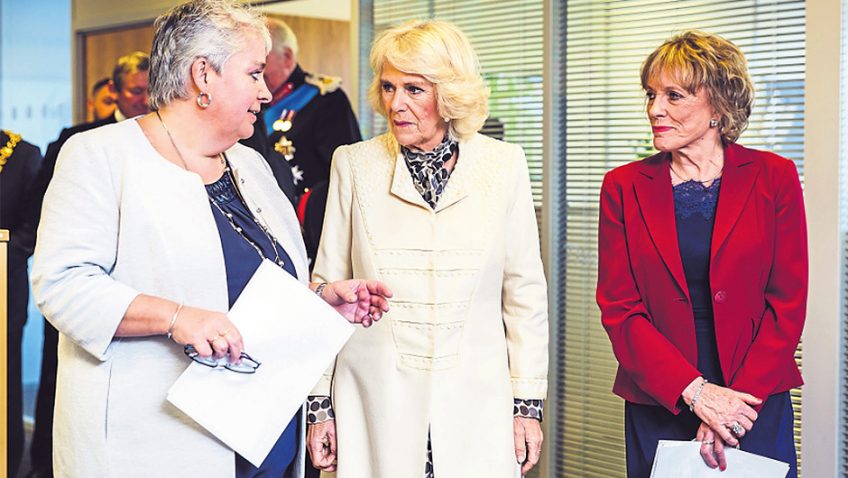Behind the quiet, closed doors of some of your neighbours, of people in your community, perhaps even of some your own friends and relatives, lurks a silent suffering that’s too easy not to notice. In the midst of our busy lives, it’s too easy to forget to pick up the phone and too easy not to make time to knock on that door: it’s too easy to look the other way on loneliness, yet, it’s something that affects us all, and particularly and increasingly, our older generation.
According to the Jo Cox Commission (JCC), 57% of older people who identify themselves as lonely, admit to never having spoken about it, with around three quarters saying close friends and family would be surprised or astonished to hear they feel lonely. 82% agreed it was easier to talk about loneliness using anonymous, confidential services, like The Silver Line.
The Silver Line, the only free, confidential helpline for older people, is working hard to break the silence of loneliness and bring this cause to the public’s consciousness.
However, supporting causes related to older people seems, sadly, to be rather far down the priority list when it comes to giving. According to The Charities Aid Foundation (CAF), in December 2017, 25% of donors gave to animal welfare charities, while the elderly did not even make it into the top five causes to receive donations. So are we in danger of failing the needs of our older generation?
The Silver Line are facing a massive fundraising challenge as they report that December alone saw a 10% rise in calls to the helpline. To draw a comparison, in the same period, there was a 4% rise in demand for A&E, which sent the NHS into crisis. While The Silver Line have an army of over 4,000 volunteers, the service is in such demand that, at the moment, they still need to raise some £15,000 per day, just to keep going.
Through their helpline, The Silver Line offers information, friendship and advice and can link callers to local groups and services. The specially-trained helpline team also make regular outbound friendship calls and work to protect and support older people who are suffering abuse and neglect.
The service is in constant demand and is available 24 hours a day, 365 days a year. Among older people, loneliness is often something that creeps in unexpectedly; it can affect even the most sociable and capable people and it transcends all demographics. If you lead an active life, have hobbies, friends to visit, family to support and plenty to do, then it’s hard to imagine that loneliness could ever affect you. But what can change with age is one’s ability to change one’s circumstances; loss of mobility, frailer health or a dwindling social circle as friends pass away can leave older people in far less control of their lives and more vulnerable to loneliness. And it can happen to anyone.
The idea that loneliness can contribute to ill health is not new. The Government Office for Science reports that: ‘there is a 50% reduction in likelihood of mortality for individuals with strong social relationships’ and that ‘people with a high degree of loneliness are twice as likely to develop Alzheimer’s as people with a low degree of loneliness.’ This highlights the importance of charities such as The Silver Line.
Esther Rantzen came up with the idea for The Silver Line – a ‘Child Line for older people’. The helpline is free, confidential and available at any time of day or night; people can call for a chat, without being judged or advised or prescribed a solution. Equally, if callers want to see a professional, or meet people face to face, the helpline can point them to resources in local communities and people to connect with via The Silver Line’s Silver Connects Service.
The Silver Line is invaluable to its users. They have callers from all walks of life and many different circumstances.
Paul, 71, a widower who lives alone, said: “I’ve called late at night when I’ve felt anxious and not been able to sleep…it felt so good to chat through a worry or problem.”
Jane, 81, said it reassures her to know the helpline’s there: “If you need somebody late at night, you don’t always feel you can call the family in case you worry them, but The Silver Line is there – it is brilliant.”
The population in the UK is getting older, with 18% aged 65 and over and 2.4% aged 85 and over. With the projection that by 2040, nearly one in seven people will be aged over 75, the need to combat the silent problem of loneliness and support older people is ever increasing; so is it time we made it a priority?
The Silver Line helpline number is: 0800 4 70 80 90. It is easy to support The Silver Line. To find out more about it, or to volunteer, fundraise or donate, visit: www.thesilverline.org.uk
By Clare Holway
This article is the latest in our series on Loneliness 2018 in Older People that we are running throughout the year.





